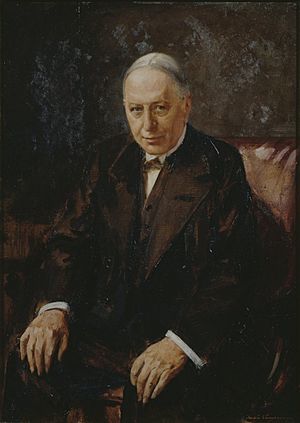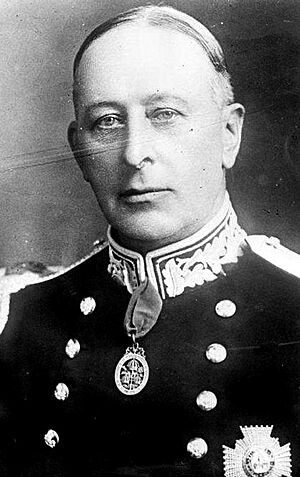Robert Chalmers, 1st Baron Chalmers facts for kids
Quick facts for kids
The Lord Chalmers
GCB PC (Ire)
|
|
|---|---|

|
|
| 21st Governor of Ceylon | |
| In office 18 October 1913 – 4 December 1915 |
|
| Monarch | George V |
| Preceded by | Reginald Edward Stubbs (Acting governor) |
| Succeeded by | Reginald Edward Stubbs (Acting governor) |
| Permanent Secretary to the Treasury | |
| In office 1911–1913 |
|
| Preceded by | T. L. Heath |
| Succeeded by | Warren Fisher |
| Personal details | |
| Born | 18 August 1858 Stoke Newington, Middlesex |
| Died | 17 November 1938 (aged 80) |
| Spouses | Maud Piggott Iris Florence |
| Children | 3 |
Robert Chalmers, 1st Baron Chalmers (born August 18, 1858 – died November 17, 1938) was an important British government official. He was also a scholar who studied the ancient Pali language and Buddhist texts. Later in his life, he became the Master of Peterhouse, Cambridge, which is a college at Cambridge University.
Contents
Early Life and Education
Robert Chalmers was born in Stoke Newington, Middlesex. His parents were John Chalmers and Julia (née Mackay). He went to the City of London School and then to Oriel College, Oxford. He earned his first degree, a Bachelor of Arts (BA), in 1881. He later became the Master of Peterhouse, Cambridge.
Robert Chalmers' Career

Working for the Government
Chalmers started working for the British government in 1882 at the Treasury. This is the department that manages the country's money. He worked his way up, becoming an Assistant Secretary from 1903 to 1907.
He then led the Board of Inland Revenue (which collects taxes) from 1907 to 1911. After that, he became the Permanent Secretary to the Treasury, a very senior role, from 1911 to 1913.
Governor of Ceylon
In June 1913, Robert Chalmers was chosen to be the Governor of Ceylon. Ceylon is now known as Sri Lanka. He held this important position from October 18, 1913, to December 4, 1915.
Some people thought Chalmers was against Buddhism. However, this was not true. Before he became Governor, he was a key member of the Pali Text Society. This group studies ancient Buddhist texts. He had already translated many Buddhist writings from Pali into English. When he arrived in Ceylon, Buddhist leaders respected him greatly for his knowledge. One of his first official duties was giving awards at a famous Buddhist university. He gave his speech in Pali, which impressed everyone there.
In 1915, some serious riots happened in Ceylon between Buddhist and Muslim groups. To stop the unrest, Chalmers declared martial law. This meant the military took control. He sent in soldiers and police to calm the situation.
After the riots, a lawyer from Ceylon traveled to the United Kingdom. He told the British government what had happened. Because of this, Chalmers was called back to England. A special investigation was started to look into the riots.
After being Governor, Chalmers briefly worked in Ireland in 1916. He then returned to the Treasury. In 1919, he was given the title Baron Chalmers. This meant he became a Lord.
A Scholar of Ancient Languages
From a young age, Chalmers was very interested in old languages. At the City of London School, he studied Greek and Latin. He also learned about Sanskrit and philology, which is the study of language in historical texts. He continued these studies at Oriel College, Oxford.
Even when he started his government job in 1882, he kept learning ancient languages. He took classes in Pāli, an ancient Indian language. He became a member of the Pali Text Society. From 1891, he wrote many articles for the Journal of the Royal Asiatic Society. These articles included his English translations of Buddhist texts.
Between 1895 and 1902, he helped publish the first English translation of the Sutta Pitaka. This is an important collection of Buddhist teachings. He used original texts from different countries like Ceylon, Thailand, and Myanmar. This translation was later updated and published again.
From 1922 to 1925, he was the president of the Royal Asiatic Society. In 1924, he became a professor at Peterhouse, Cambridge University. He taught there until 1931. His last major scholarly work was a translation of the Sutta Nipāta in 1932. This book was praised for its beautiful writing and accuracy.
Robert Chalmers had two very different careers. For almost 40 years, he translated over 2,000 Buddhist texts. He was a well-known and respected scholar. However, his deep knowledge of these ancient texts did not help him manage the riots in Ceylon. It was ironic that these riots happened in a country where the very texts he studied were written.
Family Life
Lord Chalmers married Maud Mary Piggott in 1888. After she passed away in 1923, he married Iris Florence in 1935. Robert Chalmers had two sons from his first marriage, Ralph and Robert. Sadly, both of them died during the First World War in the same month. His daughter, Mabel, lived until the 1960s.
Death
Lord Chalmers passed away in November 1938, at the age of 80. Since he had no sons who survived him, his title of Baron Chalmers ended with him. This means he was both the first and the last Baron Chalmers.
His Published Works
Robert Chalmers translated more than 2,000 Pali texts. Here are a few of his important works:
Books
- Further dialogues of the Buddha, texts of the Majjhima-nikâya, published in 1926–1927.
- Buddha’s Teachings being the Sutta-nipāta or Discourse-Collection, published in 1932.
- The Jātaka or Stories of the Buddha's Former Births, which he co-authored. This was published in several volumes between 1895 and 1907.
Other Writings
- A history of currency in the British colonies, published in 1893. This book was not about Buddhism.
- A writing about Thomas William Rhys Davids, his Pali teacher, published in 1923.
Awards and Honours
Chalmers received several important awards for his service. He was made a Companion of the Order of the Bath (CB) in 1900. Queen Victoria herself presented him with this honour. He was later promoted to Knight Commander (KCB) in 1908, and then to Knight Grand Cross (GCB) later in his career. In 1916, he was also made a member of the Irish Privy Council.
 | Roy Wilkins |
 | John Lewis |
 | Linda Carol Brown |

